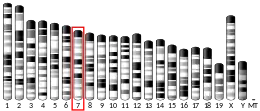TRPM5
مجرای کاتیونی پتانسیل گذرای گیرنده، زیرگروه M، عضو شمارهٔ ۵ (انگلیسی: ransient receptor potential cation channel subfamily M member 5) یا «مجرای طویل شمارهٔ ۵ پتانسیل گذاری گیرنده» که بهاختصار «TRPM5» نامیده میشود، یک پروتئین است که در انسان توسط ژن «TRPM5» کُدگذاری میشود.[4][5]
این مجرا، یک کانال کاتیونی غیراختصاصی و فعالشونده توسط کلسیم است و در ارسال پیام عصبی در سلولهایی که گیرندهٔ شیمیایی دارند، نقش دارد.
این کانال پروتئین در ارسال پیامهای مربوط به مزهٔ شیرینی، تلخی، و اومامی نقش مهمی دارد. همچنین به نظر میرسد در درک طعم چربی هم حائز اهمیت باشد.[6][7]
این مجرا همچنین در سلولهای بتا لوزالمعده هم یافت میشود[8] و در علامتدهی جهت ترشح انسولین نقش دارد.
سرانجام، این کانال در سلولهای تافت در بافت پوششی روده و اپی تلیوم تنفسی و چندین بافت دیگر بدن که گیرندههای حسی دارند، موجود است.[9]
داروی ضدقارچِ کلوتریمازول، عبور جریان عصبی را از این کانال کاهش میدهد.[10] همچنین نیکوتین موجود در دخانیات، این مجرا را مهار میکند. شاید بههمین دلیل است که افراد سیگاری، برخی طعمها رو خوب احساس نمیکنند.[11]
منابع
- GRCm38: Ensembl release 89: ENSMUSG00000009246 - Ensembl, May 2017
- "Human PubMed Reference:". National Center for Biotechnology Information, U.S. National Library of Medicine.
- "Mouse PubMed Reference:". National Center for Biotechnology Information, U.S. National Library of Medicine.
- Prawitt D, Enklaar T, Klemm G, Gärtner B, Spangenberg C, Winterpacht A, Higgins M, Pelletier J, Zabel B (January 2000). "Identification and characterization of MTR1, a novel gene with homology to melastatin (MLSN1) and the trp gene family located in the BWS-WT2 critical region on chromosome 11p15.5 and showing allele-specific expression". Human Molecular Genetics. 9 (2): 203–16. doi:10.1093/hmg/9.2.203. PMID 10607831.
- Clapham DE, Julius D, Montell C, Schultz G (December 2005). "International Union of Pharmacology. XLIX. Nomenclature and structure-function relationships of transient receptor potential channels". Pharmacological Reviews. 57 (4): 427–50. doi:10.1124/pr.57.4.6. PMID 16382100.
- PubMed
- PubMed
- Colsoul, B.; Schraenen, A.; Lemaire, K.; Quintens, R.; Van Lommel, L.; Segal, A.; Owsianik, G.; Talavera, K.; Voets, T.; Margolskee, R. F.; Kokrashvili, Z.; Gilon, P.; Nilius, B.; Schuit, F. C.; Vennekens, R. (1 March 2010). "Loss of high-frequency glucose-induced Ca2+ oscillations in pancreatic islets correlates with impaired glucose tolerance in Trpm5-/- mice". Proceedings of the National Academy of Sciences. 107 (11): 5208–5213. doi:10.1073/pnas.0913107107.
- Kaske, S; Krasteva, G; König, P; Kummer, W; Hofmann, T; Gudermann, T; Chubanov, V (4 July 2007). "TRPM5, a taste-signaling transient receptor potential ion-channel, is a ubiquitous signaling component in chemosensory cells". BMC Neuroscience. 8: 49. PMID 17610722.
- Ullrich, ND; Voets, T; Prenen, J; Vennekens, R; Talavera, K; Droogmans, G; Nilius, B (March 2005). "Comparison of functional properties of the Ca2+-activated cation channels TRPM4 and TRPM5 from mice". Cell calcium. 37 (3): 267–78. PMID 15670874.
- Gees, M; Alpizar, YA; Luyten, T; Parys, JB; Nilius, B; Bultynck, G; Voets, T; Talavera, K (May 2014). "Differential effects of bitter compounds on the taste transduction channels TRPM5 and IP3 receptor type 3". Chemical senses. 39 (4): 295–311. PMID 24452633.
- مشارکتکنندگان ویکیپدیا. «TRPM5». در دانشنامهٔ ویکیپدیای انگلیسی، بازبینیشده در ۲۴ ژانویه ۲۰۱۸.
بیشتر بخوانید
- Philippaert, K; Pironet, A; Mesuere, M; Sones, W; Vermeiren, L; Kerselaers, S; Pinto, S; Segal, A; Antoine, N; Gysemans, C; Laureys, J; Lemaire, K; Gilon, P; Cuypers, E; Tytgat, J; Mathieu, C; Schuit, F; Rorsman, P; Talavera, K; Voets, T; Vennekens, R (31 March 2017). "Steviol glycosides enhance pancreatic beta-cell function and taste sensation by potentiation of TRPM5 channel activity". Nature Communications. 8: 14733. PMID 28361903.
- Islam, Md. Shahidul (January 2011). Transient Receptor Potential Channels. Advances in Experimental Medicine and Biology. 704. Berlin: Springer. p. 700. ISBN 978-94-007-0264-6.
- Liman ER (2007). "TRPM5 and taste transduction". Handbook of Experimental Pharmacology. Handbook of Experimental Pharmacology. 179 (179): 287–98. doi:10.1007/978-3-540-34891-7_17. ISBN 978-3-540-34889-4. PMID 17217064.
- Holzer P (July 2011). "Transient receptor potential (TRP) channels as drug targets for diseases of the digestive system". Pharmacology & Therapeutics. 131 (1): 142–70. doi:10.1016/j.pharmthera.2011.03.006. PMC 3107431. PMID 21420431.
- Boesmans W, Owsianik G, Tack J, Voets T, Vanden Berghe P (January 2011). "TRP channels in neurogastroenterology: opportunities for therapeutic intervention". British Journal of Pharmacology. 162 (1): 18–37. doi:10.1111/j.1476-5381.2010.01009.x. PMC 3012403. PMID 20804496.
- Liman ER (2010). "Changing Taste by Targeting the Ion Channel TRPM5". The Open Drug Discovery Journal. 2: 98–102. doi:10.2174/1875039701407010001.
- Brixel LR, Monteilh-Zoller MK, Ingenbrandt CS, Fleig A, Penner R, Enklaar T, Zabel BU, Prawitt D (June 2010). "TRPM5 regulates glucose-stimulated insulin secretion". Pflugers Archiv. 460 (1): 69–76. doi:10.1007/s00424-010-0835-z. PMID 20393858.
- Oliveira-Maia AJ, Stapleton-Kotloski JR, Lyall V, Phan TH, Mummalaneni S, Melone P, Desimone JA, Nicolelis MA, Simon SA (February 2009). "Nicotine activates TRPM5-dependent and independent taste pathways". Proceedings of the National Academy of Sciences of the United States of America. 106 (5): 1596–601. doi:10.1073/pnas.0810184106. PMC 2635785. PMID 19164511.
- Liu D, Zhang Z & Liman ER (May 2005). "Extracellular acid block and acid-enhanced inactivation of the Ca2+-activated cation channel TRPM5 involve residues in the S3-S4 and S5-S6 extracellular domains". The Journal of Biological Chemistry. 280 (21): 20691–9. doi:10.1074/jbc.M414072200. PMID 15731110.
- Liu D, Liman ER (December 2003). "Intracellular Ca2+ and the phospholipid PIP2 regulate the taste transduction ion channel TRPM5". Proceedings of the National Academy of Sciences of the United States of America. 100 (25): 15160–5. doi:10.1073/pnas.2334159100. PMC 299934. PMID 14657398.
- Wu LJ, Sweet TB, Clapham DE (September 2010). "International Union of Basic and Clinical Pharmacology. LXXVI. Current progress in the mammalian TRP ion channel family". Pharmacological Reviews. 62 (3): 381–404. doi:10.1124/pr.110.002725. PMC 2964900. PMID 20716668.
پیوند به بیرون
- TRPM5 protein, human در سرعنوانهای موضوعی پزشکی (MeSH) در کتابخانهٔ ملی پزشکی ایالات متحدهٔ آمریکا


